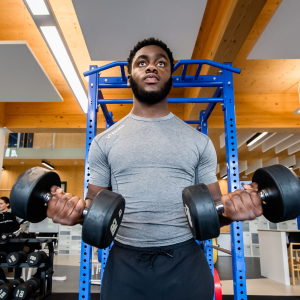Course Description
Discover, apply and collaborate to create the foundations for your future. Supporting the development of specialist practitioners within sport and physical activity, the two-year FdSc Applied Sports Conditioning and Exercise* programme aims to develop your knowledge and understanding of related theory, whilst evolving your skillset and real-world experience. Discover the science and theory associated with human anatomy, psychology, training and performance. Apply your knowledge and understanding in our unique sports setting and beyond. Collaborate with peers, staff and academy athletes, gaining practical experience and inspiring others to be physically active and at peak performances.
Be more than a graduate
Working with our team of industry and academic specialists, in conditioning and exercise, you will be immersed in the university environment at our University Centre WISE. Engaging in a hybrid-learning approach to your studies with both virtual and campus-based lectures; practical seminars and workshops, you will develop topic-focused knowledge, together with wider employability and industry-relevant skills, preparing you to be more than a Graduate. The Applied Sports Conditioning and Exercise programme is a two-year foundation degree (FdSc), comprising of 2 years (levels 4 and 5) and can be followed by the level 6 top up in Applied Sports Conditioning & Exercise (BSc Hons).
Industry Focused
With an industry focus, the first year has been designed to provide the foundation for your knowledge and understanding, focusing on human function and movement; psychology; training principles for sports conditioning and exercise; nutrition; physiology and performance; how do multi-disciplines work together for overall performance? Application is the key upon progressing to the second year, developing further independent academic skills through research and practical skills in conditioning, exercise and rehabilitation, through a variety of taught and practical modules and continuing your professional practitioner journey.
.svg)
-min.jpg)
.png)


.png)
.png)
.png)
.png)
.png)
.png)
.png)
.png)

.png)
.png)
.png)
.png)